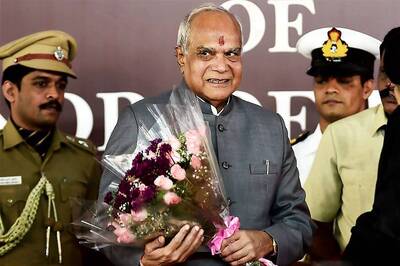
views
The National Medical Council (NMC) – the apex body to regulate medical education in India – has decided to amend some rules for the incoming medical students from war-torn Ukraine.
The authority has announced that these foreign medical graduates with incomplete internships will be given the chance to finish their training in India.
The NMC, in an official notification, said that foreign medical graduates are facing hardships in getting themselves registered in some of the state medical councils amid Covid-19 and the ongoing evacuation of Indians from Ukraine.
At a glance, the move seems welcoming. However, while describing the entire procedure, the NMC ends up asking for “documentary evidence certifying successful completion of physical training or internship during the medical qualification equivalent to MBBS”.
But such evidence may not be available with the students considering they have been evacuated from a war.
Students, in an interview to News18.com, pointed out that they are coming back without any documentary proof in hand.
“We have no documents and we are not sure how we will get the transfer letter. We can only request the Indian government to make changes considering the emergency situation,” Faisal Kassim, a fourth year student at Kharkiv National Medical University, said.
For such students, the NMC’s move may not make any sense.
“We have come back in emergency situations where we did not pick even our basic stuff. We don’t have any documents and even our professors might have flown out of the country. We are unsure if our university building exists anymore or not,” another medical student from Munnar, Kerala told News18.com.
While NMC should consider the revision of the “knee-jerk reaction” policy, there are a few other policies where the NMC and National Board of Examinations (NBE) can consider an amendment or removal – in the context of students coming back from Ukraine and also for regular admissions.
Not Allowed to Study MBBS From Multiple Colleges
The current regulations under the National Medical Council do not allow migration of medical students from one medical college to another. It means if a student has been enrolled in an MBBS course in one college, they must complete the course from the same college.
While the rationale is to complete the curriculum in an uninterrupted manner from one college – which includes different books, study material, exam pattern apart from fees – the rules must consider emergency scenarios or genuine circumstances beyond the students’ control, a glaring instance being the ongoing war in Ukraine.
Uncertainty looms large as no one even knows if these students will be able to go back to their universities. “We don’t know even if the building of their colleges will exist anymore. Will it still be known as Ukraine or will it become Russia?” students told News18.com, sharing their mutual concern.
The rule restricts the movement of students from changing colleges even if they realise that they have taken admission in a sub-standard college or realise that they are unable to settle in.
Not Allowed to Request Re-Checking or Re-Totalling of FMGE Score
Students who complete their medical degrees from foreign universities are required to take the Foreign Medical Graduates Exam (FMGE) in order to pursue medical practice in India.
The students have to sign a non-disclosure agreement with NBE before sitting for an entrance exam. According to NBE’s rule: “There will be no re-evaluation or re-checking or re-totalling. Requests for re-evaluation/re-totalling shall not be entertained.”
Also, it says that the “content of this exam is confidential, proprietary and is owned by NBE”.
Considering the paper has multiple choice questions and estimating the score is not very difficult, the students should be given an option to access the answer key with solved answers and apply for re-evaluation. Like other exams, the NBE can forfeit the money if the request proves to be wrong.
One Year To Go, Silence Over NEXT
The government is delaying the crucial announcements on NEXT – the exam which will replace FMGE. NEXT will also be a common final year undergraduate medical examination for granting licence to practise medicine as medical practitioners and for enrolment in the State Register or the National Register.
National Exit Test (NEXT) will become the single test for obtaining licence to practise medicine as a medical practitioner in India. It will replace the existing “Screening Test for Indian Nationals with Foreign Medical Graduate Qualifications” in operation since May 2002.
It will also be the basis for admission to the postgraduate broad-speciality medical education in medical institutions.
Announced in 2020, the test has to begin from the first half of 2023 – which is just a year away from now. For medical students, preparations begin much in advance.
NMC has to conduct the NEXT through a designated authority, as per the notification. So far, no announcement has been made on who will be the ‘designated authority’. In fact, mock tests are supposed to begin mid-2022 to test the exam systems and prepare the candidates.
However, no formal rule, regulation or document has been notified, so far. The scheme for NEXT remains a work in progress.
Double Internship Without Any Help to Hunt for Opportunities
In normal times, the students coming back to India after completing MBBS from foreign colleges – despite undergoing an internship in foreign countries – are expected to again undergo year-long internship in India.
According to the rules, any person who pursues the foreign medical degree should have undergone a course of theory, practical and clinical training equivalent to Bachelor of Medicine and Bachelor of Surgery (MBBS) of India; and
(b) Should have been completed internship of 12 in addition to such course referred to in clause (a), in the same foreign institution where the primary medical qualification has been obtained, along with hands-on training in clinical subjects including but not limited to Community Medicine, General Medicine, Psychiatry, Pediatrics, General Surgery, Anesthesia, Obstetrics and Gynecology, Orthopedics, Otorhinolaryngology, Ophthalmology, Dermatology, Emergency or Casualty services, lab services and their sub-specialties.
“For foreign students, it adds one additional year before they register themselves as doctors in India. While students in Indian colleges can start practise after four years and six months of education cum 12 months training, the foreign return students require five years and six months plus 12 months training,” Bipin Batra, former executive director of National Board of Examinations (NBE), the apex regulatory body for post graduate medical education in India.
In Russia and Ukraine, language training for six months is over and above this duration.
“Moreover, there is no established system by the NMC where these students can hunt for internship opportunities. The time they spend on finding the internship opportunities is also additional over and above 6.6 years of MBBS,” Batra pointed out.
Read all the Latest News India and Breaking News here




















Comments
0 comment